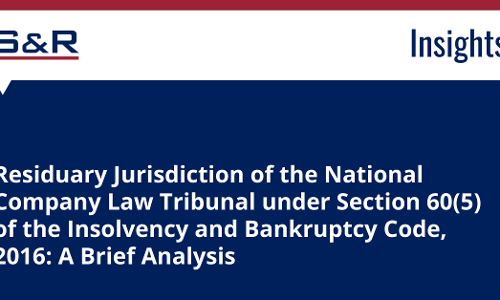Law Firm Articles
Arbitration, Mediation & Negotiations Heading The Digital Way
Digitization has changed the way we bank, shop, learn, stay fit, get entertained and stay connected. The list of things we can do online is endless. Online Dispute Resolution("ODR") is an extension to the above and simply adds the phrase "resolving disputes" to the list. ODR is the resolution of disputes, particularly small- and medium-value cases, using digital technology and techniques of alternate dispute resolution (ADR), such as negotiation, mediation, and arbitration. While...
"Pitch It Tactfully", Say Lawyers Recommending Mediation To Clients
CAMP Mediation is observing 2021 as the year of #CALM (Celebrating Advocates & Lawyers in Mediation). Via a series of articles, the author aims to highlight the developing trends of private commercial mediation in India, through the lens of lawyers and advocates who have skilfully and strategically offered their legal counsel in a collaborative, yet competitive environment.
Residuary Jurisdiction Of The National Company Law Tribunal Under Section 60(5) Of The Insolvency And Bankruptcy Code, 2016: A Brief Analysis
Pursuant to Section 60(5) of the Insolvency and Bankruptcy Code, 2016 ("Code") the National Company Law Tribunal ("NCLT") is bestowed with the jurisdiction to decide: (i) 'any' application or proceeding against a corporate debtor; (ii) 'any' claim made by or against a corporate debtor including claims by or against its subsidiaries; and (iii) 'any' questions of priority or 'any' question of law or facts, arising out of or in relation to insolvency resolution or liquidation proceedings of...
'Ipso Facto' Termination In India: Valid Or Invalid?
On March 8, 2021, Hon'ble Supreme Court delivered a judgement highlighting the need for the Legislature to provide clarity on the validity of ipso facto clauses in India in the context of insolvency laws. The Hon'ble Court, being well aware of its remit, adopted a 'workable formula', applicable only in the given factual matrix, to address the issue in question and did not encroach the legislature's role in formulating a policy with respect thereto. In fact, the Hon'ble Court has put forth...
Creating Conducive Workplace To Fight Pandemic Aftermath In Organizations
Covid-19 compelled organizations to focus on two key aspects of doing business during pandemic, data protection and talent retention, among others. For these two aspects, the technology officers and human resource professionals have been constantly required to revisit their strategies to manage and deal with data safety and employee retention, respectively, in the organization. Though most of the organizations offered clear and continuous communication to prepare employees to deal with the...
Victim's Copy Of Chargesheet: Who Will Bear The Charge - Special Court (POCSO)/Ld. Magistrate Or The Police, Under Section 25(2) Of POCSO Act?
"The victim of crime is often a forgotten person in our criminal justice system"- Cleroux, R. (1987, November 6). Sweeping Reforms Proposed in Payments to Crime Victims. The Toronto Globe and Mail, p. 2. The persons acting as guardians for or in respect of welfare or concern towards the child victim somehow glue their eyes with intensified hurry, unknowingly hoping for a swift dispensation of justice, probably under the belief of the unsaid sketchy mandate of sub-section (2) of Section...
An Overview Of The Concept Of Jurisdiction
One of the preliminary questions that a legal practitioner must deal with vis-à-vis a dispute which has arisen or a potential dispute which may arise out of a transaction or legal relationship between parties is that which forum/s has/have/will have the jurisdiction to entertain the dispute/potential dispute. In this article I shall be briefly discussing the concept of jurisdiction since, though the concept in itself is not laborious to fathom, however, a wrong interpretation of the same...
Relational Contracts: Time For Legal Recognition In India
With the invention of wheel, mankind accelerated its growth against time. To further accelerate the growth of mankind, it is important to give pace to the wheels. Development of Infrastructure is the bedrock of India's economic growth and plays a pivotal role in accelerating the growth of India's overall social, political and economic development. The Infrastructure sector covers wide range of sub-groups namely roads, ports, power, railways, telecommunications etc. In order to develop,...
Shifting Of Seat Of Arbitration
In recent times, the arbitration law in India has evolved many folds. It has been settled by the Supreme Court that 'seat of arbitration' determines the jurisdiction of the court in an arbitration matter. However, what happens when the venue/ seat of arbitration is changed. The present article deals with a recent judgment passed by the Supreme Court in Inox Renewables Ltd. vs. Jayesh Electricals Ltd.[1]clarifying this aspect. The above judgment finally settles a vital question of law...
Insolvency Of Personal Guarantors To Companies: An Atmosphere Of Uncertainty
Corporate Insolvency Resolution Process can now be triggered against the personal guarantors of a corporate debtor including the promoters of a corporate person by its creditors through rules notified on 15.11.2019 by the Ministry of Corporate Affairs. The entire set of rules have flooded the gates of Courts all over against the constitutionality of the new provisions with the notification being challenged by almost 100 promoters including the billionaire Industrialists like Arvind Dham,...
Limitations In Exercising Jurisdiction U/S 482 Of The Code Of Criminal Procedure
It is the prerogative of an accused to approach the High Court of appropriate jurisdiction with a prayer to quash the First Information Report ( FIR) that is registered against them. This plea can be adopted at any point of time be it before or after filing the charge sheet. Similarly whether or not the accused has obtained bail is not of relevance. However, one often comes across the prayer for "no coercive steps" or "stay of arrest" in a petition u/s 482 of the Code of Criminal...
Role Of 'Intellectual Property' While Tackling The 'International Pandemic'
The debaters of intellectual property (IP) exclusivity versus the public interest at large have been always at loggerheads. While protection of IP right gives the due impetus and encouragement to innovate for the public, the same IP exclusivity is often seen as a hindrance is making such remarkable innovations available to the public. It has always been a challenge for Legislators, Courts and Law Enforcement Agencies alike to strike a right balance between the private right of IP and...












